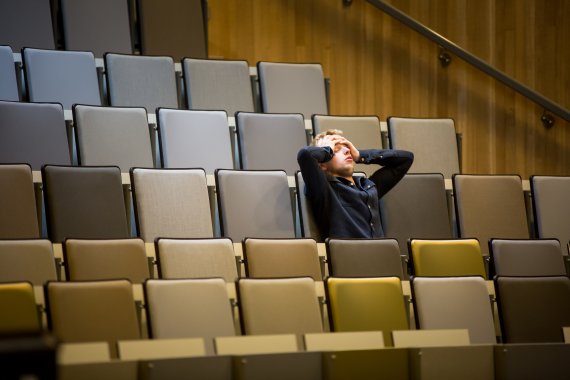© Sven Menschel Today, the RIVM published its Volksgezondheid Toekomstverkenning 2018(Future outlook on public health 2018). At the end of last year, the institute had already determined that young people appear to be experiencing increasing pressure, e.g. due to cutbacks on student financial assistance and the greater impact of the binding study advice.
Survey
For its report, the RIVM not only questioned everyday citizens, it also surveyed professionals and students from the healthcare sector: in their opinions, what are the most urgent developments and what must be done to keep the Netherlands healthy?The report hardly presents any concrete figures, because psychological pressure is difficult to measure. ‘We reviewed a number of factors which we know increase pressure”, says Harald Wychgel, information officer of the RIVM. “When those factors increase, you can assume that pressure increases as well.’An example of this is the use of ADHD medication without prescription by many students so that they can concentrate better. The use of social media can also generate pressure and cause stress, which in turn can lead to mental problems, such as depression and sleep disorders.
Depression
According to student psychologists, young adults increasingly struggle with complex mental issues. The RIVM also reports that nearly half of young people between 18 and 25 indicate feeling tired or exhausted. Roughly one in five feels worried or stressed, while over 80 per cent feel happy.Of the three groups that the RIVM questioned, it was primarily the students, specifically 154 WO and HBO students in the healthcare sector, who were concerned about pressure on mental health. The other groups were more afraid of impending resistance to antibiotics, cardiovascular illness, cancer, and dementia.
There still seems to be a substantial lack of clarity and a lack of concrete data. This is why young people should be ‘monitored’ to gain more insight into the pressure they experience. The report also states that more knowledge should be acquired about ‘stressors and mechanisms that create pressure on mental health’.Interventions A larger ‘intervention approach’ on handling stress targeted at young adults should keep student well-being at a satisfactory level and campaigns and informative materials should work to dispel any stigmatisation.The future outlook from the RIVM is published every four years and maps out the most important developments in the field of public health. Policy makers can benefit from it by promptly responding to the trends that the RIVM detects.
According to the Dutch National Students’ Association (ISO), the report once again shows that the well-being of the younger generation deserves more attention. The student organisation notes that institutes of higher education also have an important responsibility in all this.
Lees meer:
More Wageningen students visit psychologist due to study stress
Survey – Study stress: the new norm

